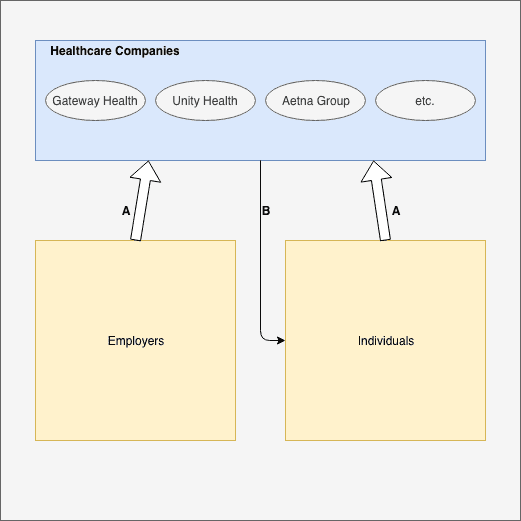June 22, 2018
How Privatized Healthcare is Just Universal Healthcare That's Ripping You Off
The following post essentially represents a series of observations regarding the current healthcare system in the United States that have manifested themselves within my deep psyche. I don't pretend to be a medical professional, but then again it doesn't take one to note the ins and outs of an economic powerhouse from the outside. This post is not comprehensive, nor should it be seen as an attempt at a hint at policy building of any kind; I don't pretend to be a politician either.
How it works
In figure 1-1, the following phenomena is displayed:
A.) Employers and Individuals contribute to various companies within the private Healthcare entity*. The prices that are paid are based on three factors:
- The plan chosen
- A formulaic cost of the plan, calculated by various statistics** aggregated by the company
- The margins the company wishes to make (this should scare most, except for healthcare companies, that is) B.) The companies within this entity pay the healthcare costs of their covered individuals that require services.
- The "entity" in this case being the collection of all private healthcare providers in the country. ** How much the entity will have to pay out for patient coverage in any given block of time. I don't think it's a stretch to say this number is likely inflated or an egregious miscalculation in favor of the entity.
Think with me here: at a very high level, the private healthcare system is a black box whose input is cash and whose output is far less cash. It's a highly profitable entity whose revenue is directly attributed to the statistics that only a minute few of the participating "customers" will require services that cost more than their individual contribution to the revenue.
Whom does it benefit?
From the surface, it seems that the primary beneficiaries (yes, pun intended) of a system like the one described above are as follows:
- The companies that make up the private healthcare entity (see their increased profitability indexes)
- Via plans to obtain bigger tax breaks through lobbying
- Via "minimizing operational costs," which is fancy marketing speak for automating as much of their lower clerical workforce as possible
- Via subsidies and toxic marketing schemes against any attempt to centralize healthcare
- Politicians that are catered to by lobbyists of the healthcare entity
- Mmmm, recent corruption
Whom does it hurt?
- The people that pay the healthcare entity for services
- By paying more than they have to (more than they should)
- See this if you're not sold on the idea
- The people that cannot afford the healthcare entity
- Options for this group:
- 1.) attempt to afford market
- Likely placing themselves in debt during the process
- 2.) pick a subsidized plan
- Thus contributing to the statistic that most private companies like to throw around (percentage of people on "Obamacare", or the ACA)
- 3.) go uninsured
- Directly influencing higher healthcare prices
- Like this
- Or this
- The employers that compete to offer healthcare options to employees
Micro-conclusion
I'm hard-pressed to believe that the current healthcare system in the United States is not the by-product of decades of collusion amongst ever-growing entities, the creation of overly-complicated bureaucratic documentation dumped on consumers and a gaming of the current political system. Anyone who can agree with the simplistic, albeit accurate, high-level description of today's system given above should be able to understand my next point. If health insurance providers form a giant entity that collectively represents a pool of money to be used for the greater good of the people that buy into it (that number of people always being statistically the minority of said people mind you) then would it not make sense to eliminate the abstraction of this service across a number of entities and allow for a centralized system to dictate the payout of healthcare needs?
Yes, I understand that the current system we endure caters to a nicely structured micro-economy. The market dictates which insurance providers thrive, stick around, and do their job. I'm not suggesting that we abolish capitalism and centralize everything that happens to be involved with the greater good of the population. What I am suggesting is that within the context of healthcare, this micro-economy has grown to a size such that the job I just mentioned is now ill-defined. Allowing the market to dictate the cost of healthcare is doing nothing but constantly shifting the priority of insurance providers - from providing healthcare costs to the needy - to optimizing profits at all costs.
Sources
All information provided above is editorial content provided by yours truly. Any URLs provided are to sources I find somewhat credible and reparable.
For the record, I came across many sources that were defending the giant conglomerates we let dictate our healthcare options and decisions. The most compelling I found is this piece by a site called Very Well Health, and perhaps it's no coincidence that it's often healthcare-related organizations that seem to defend insurance agencies the most.
